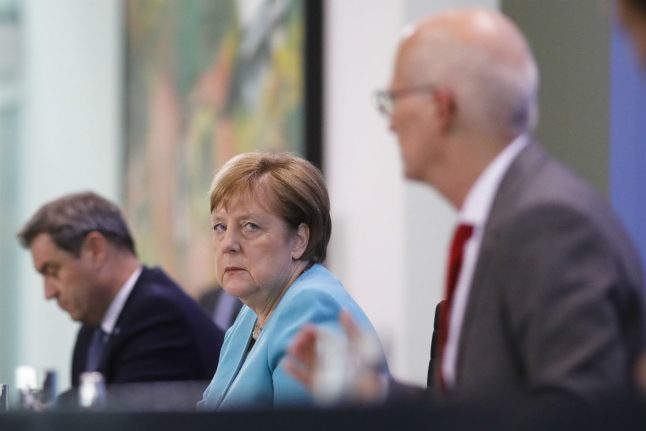Social distancing rules and masks will continue to be required in shops and public transport, Chancellor Angela Merkel (CDU) said after a meeting with premiers of Germany's 16 states.
But schools are expected to return to normal operations after the summer holidays.
“As long as there is no vaccine and no medicine available we must maintain basic measures to protect ourselves,” said Merkel.
Schools back in operation
Schools are to return to regular operation in all countries after the summer holidays at the latest, assuming that the situation remains stable.
Their organization will be discussed on Thursday at a conference between state premieres and educational experts.
“Everyone agrees that we need regular schooling again,” said North Rhine-Westphalia's Minister President Armin Laschet (CDU).
It will then be up to the schools themselves to decide on distancing rules, the president of the Conference of Education Ministers and Rhineland-Palatinate Minister of Education Stefanie Hubig (SPD) said.
In elementary schools in various federal states, teaching is already taking place again in class and without distance rules.
Event ban and distance rules
In addition, the states want to ban major events until at least the end of October, extending a ban which was first set for August 31st. This applies to events where it is not possible to track contacts and comply with hygiene rules.
READ ALSO: Major events set to be banned in Germany until 'at least end of October'
The government noted that rules to maintain a minimum distance of 1.5 metres as well as requirements to cover up noses and mouths in closed public spaces have helped in the fight against new transmissions.
It is now counting on contact tracing — both through human trackers as well as through a new app — to ensure that any new infections are isolated.
The government added that large-scale testing for the virus would be carried out in places with “groups of vulnerable people”.
Merkel has repeatedly warned against complacency before a viable vaccine is found.
Underlining the volatility of the situation, an outbreak in a slaughterhouse in western Germany's Rheda-Wiedenbrück region led 400 workers to test positive for the virus.
And in one Berlin neighbourhood, 370 families living in high-rise flats have been put under quarantine after 70 infections were detected.
Putting “hundreds of families in quarantine is hard work, but it must be done,” said Merkel.
“These outbreaks show us that the virus has not gone away,” she warned.
READ ALSO: Schools and Kitas in German district to close after 400 employees test positive for coronavirus



 Please whitelist us to continue reading.
Please whitelist us to continue reading.
How did they define “Major Events”?
How many people are they on about?
Since they are allowing airplanes to fly at full capacity, meaning including boarding, flight, and luggage pick-up, more than 200 people PER FLIGHT are allowed to totally disregard the distancing rule for 3 hours or more, how do they dare say that Cinemas, Theatres, & Music Venues must stick to the Distancing rules?
Two standars here.
Money Talks, yet again.